As a company specialising in the coating and assembly of bikes and e-bikes marketed under the Decathlon brand, BEEP Srl has recently opened a new factory designed to coat and assemble up to half a million bicycles per year. For this ambitious project, it turned to the company Visa Impianti, which designed and installed its new coating line in collaboration with Futura Convogliatori Aerei and Wagner Italia.
In the vibrant two-wheeler scene, Italy is steadily one of the world’s leading bicycle manufacturing countries, combining traditional craftsmanship and cutting-edge technology. The beating heart of this sector lies within the Turin-Milan-Genoa “industrial triangle”, an area steeped in passion and expertise, which has been attracting talent and investment over the years to become a beacon for companies aspiring to excellence in this world. BEEP, an acronym for Bike E-bike European Production, stands out among them: headquartered in Tortona, in the province of Alessandria, it specialises in powder coating and assembly of bike and e-bike components on behalf of the world’s leading sports retailer, Decathlon.
It recently installed a new frame coating system, and when it came to choosing the technological partners to rely on, it had no doubts in turning to three Italian companies with which it has already been successfully collaborating for years: Visa Impianti (Triuggio, Monza e Brianza), which designed and installed the new powder coating line, Futura Convogliatori Aerei (Robecco Pavese, Pavia), which supplied the power&free conveyor, and Wagner Italia (Valmadrera, Lecco) for the installation of Super Cube booths. One of the main peculiarities of this new plant is the possibility to apply decals in-line, thanks to the integration of an infrared oven with panels provided by Infragas (Mappano, Turin). “Applying decals off-line can cause several operational issues, including longer cycle times due to the need to manually handle the components among different workstations. However, the layout devised by Visa Impianti with an in-line infrared oven has allowed us to optimise and make our entire coating process more efficient,” says Nicholas Giaime, project manager at Telai Olagnero.
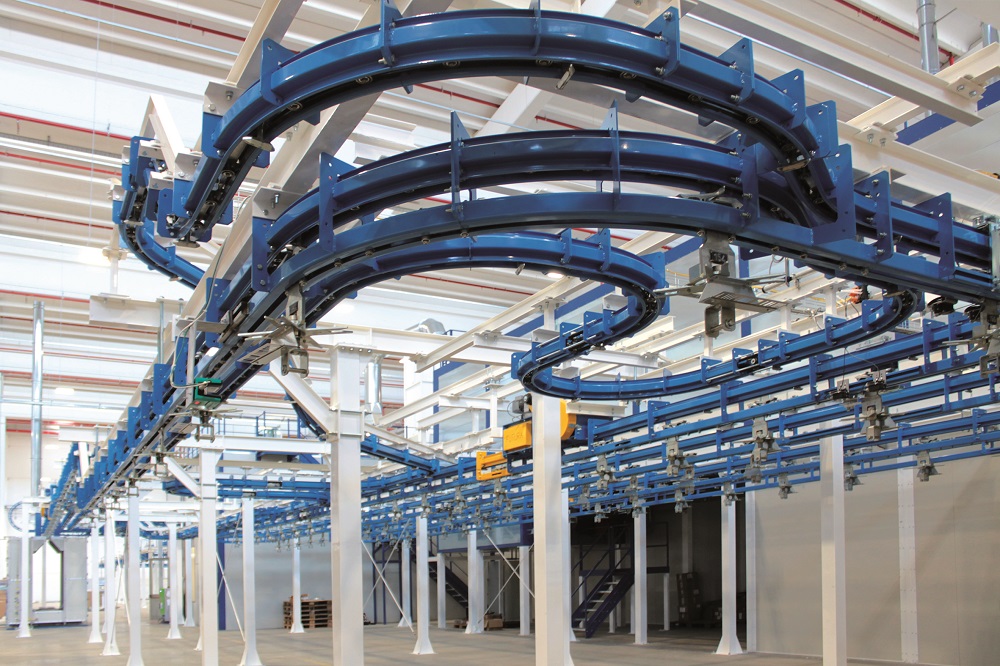 Overview of the coating plant. © ipcm
Overview of the coating plant. © ipcmExcellence in the bicycle sector
BEEP Srl was established in 2021 in Tortona, founded on a passion for sport and the relentless pursuit of technological innovation, and has since been specialising in powder coating and assembling bicycle frames. “BEEP’s creation stemmed from the need for a factory that would coat and assemble electric and mountain bikes exclusively for French multinational Decathlon, which is actually one of this company’s shareholders together with Vittorio Olagnero, the owner of prestigious manufacturer Telai Olagnero, and Francesco Russo, a former Decathlon executive,” illustrates Nicholas Giaime.
For several years now, e-bikes have been winning the hearts of cycling enthusiasts worldwide, who increasingly demand bicycles with high-quality components and customised finishes. “Most of the parts used to produce e-bikes come from Asian markets. This new factory was established in response to Decathlon’s need for a production and assembly hub for e-bikes in Italy to limit the geographical distance and, consequently, all costs and any logistical issues,” adds the project manager. With a total area of 11.000 m2, the new BEEP facility will be able to coat and assemble up to half a million bicycles per year within five years.
The production cycle and the new coating line
In its plant, BEEP produces a wide range of bicycles, ranging from classic mountain bikes to electric bikes, both with frame-integrated batteries and with external batteries (for adults only). “The coating of e-bikes accounts for 80% of our production and that of regular bikes for the remaining 20%,” explains Giaime. BEEP’s production process begins right with the preparation of the surfaces to be coated. Components such as frames, forks, and rear racks are supplied directly by Decathlon and stored in the company’s adjacent warehouse. After quality control, the operators manually load the frames onto the coating line. Each load bar accommodates four frames regardless of their type and size.
The pre-treatment phase uses chemicals supplied by Chemetall (Giussano, Monza e Brianza) and includes the following stages:
- Pre-degreasing
- Degreasing
- 2 rinses with mains water
- 1 rinse with demineralised water
- Nanotechnology passivation
- 1 final rinse with demineralised water.
“Currently, we process exclusively aluminium, but in future we plan to treat steel substrates as well. Therefore, we opted for a multi-metal nanotechnology product,” says Giaime.
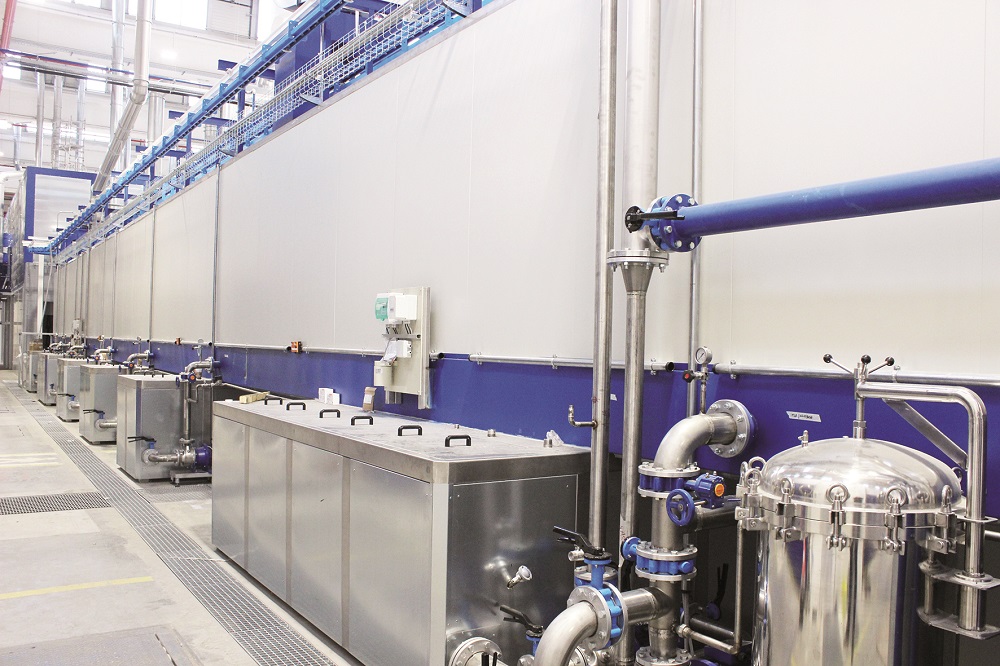 A detail of the pretreatment tunnel. © Visa Impianti
A detail of the pretreatment tunnel. © Visa ImpiantiAfter the drying phase, which takes place in a conventional bell furnace with an indirect heat exchanger and a heat recovery unit, the power&free conveyor designed by Futura Convogliatori Aerei takes the frames to the Wagner Super Cube booths. “We have two booths, applying coloured base coats and clear coats, respectively. However, the system is prearranged for integrating an additional booth in future,” indicates Telai Olagnero’s project manager. As for the pains applied, BEEP exclusively uses polyester powders supplied by Adapta Color (Castellón, Spain) and Tiger Coatings (Negrellistraße, Austria). “The coating process ends when the components enter the curing oven, whose residual heat is conveyed to the drying oven. They then reach the cooling tunnel and are finally unloaded,” explains Paolo Massari of Visa Impianti. The takt time is 72 seconds per load bar, but BEEP plans to lower it to 65 seconds.
As well as the entire production department, the coating plant was designed to meet Industry 4.0 requirements. “Our management software package enables us to control every data and parameter of each production and coating phase, both on-site and remotely. In addition, each frame is assigned a unique QR code, which ensures a high degree of traceability and prevents any errors during the coating process: as the programme matched with each type of frame is set to apply a given colour, the system will stop if the operator mistakenly selects a different tint from the powder centre.”
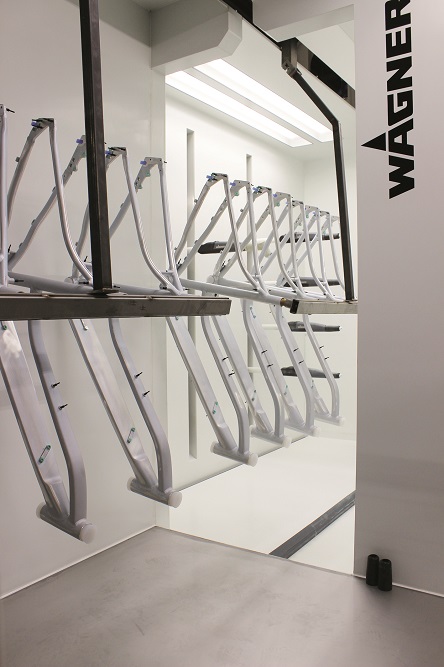 The frames at the entrance to the coating booth. © Visa Impianti
The frames at the entrance to the coating booth. © Visa ImpiantiFollowing finishing, the coated parts are stored in the adjacent warehouse, waiting to be assembled. When BEEP receives an order, they are ready to undergo the assembly process, which includes installing all the components required to complete the bicycle, such as handlebars, wheels, pedals, brakes, and the saddle. Once assembly is complete, every detail is carefully checked to ensure the quality and safety of the end product before it is packed and prepared for shipment to one of Decathlon’s sorting centres across Europe.
The flexibility of the new coating plant also allows for sticker and decal application
To further customise these bikes with stickers and decals, the plant was designed to allow the components to undergo differentiated processes. “The sticker and decal application phase varies depending on several factors: the type of stickers, the bicycle model and, above all, the customer’s requests,” indicates the project manager. The coating and cosmetic finishing cycles the Visa Impianti system can perform are as follows:
- Base coat application – Sticker application
- Base coat application – Sticker application – Clear coat application
- Base coat application – Clear coat application – Sticker application
“We are also developing a finishing cycle that includes the application of water-based decals, a state-of-the-art process used exclusively for the top-of-the-range bicycles in Decathlon’s product range. From a technical point of view, similarly to polyester decals, water-based decals can also be applied both before and after the clear coat,” adds Giaime.
“To ensure the highest level of flexibility, the plant is equipped with an in-line infrared oven equipped with panels supplied by Infragas, which is switched on and off as required, as it is only used with two-coat cycles, namely when BEEP needs to apply a base coat, stickers, and a clear coat. For the clear coat to adhere at best after the stickers’ application, the IR oven heats the frame’s surfaces to around 50 °C and evaporates the alcohol-based product that the operators use to clean them of excess sticker glue and remove any fingerprints. On the other hand, if only a base coat and stickers need to be applied, the components do not have to be taken to the infrared oven,” explains Massari.
Flexibility is also ensured by the power&free conveyor supplied by Futura Convogliatori Aerei. “At BEEP, decals are applied in-line and manually. Therefore, it is essential that the plant is adapted to the working speed and height of the people in charge of this operation. This is why, during the design phase, we conducted numerous tests with the company’s operators to identify the ideal timing and height for correct sticker application,” says Stefano Gerletti from Futura. To meet this requirement, Futura has supplied a power&free conveyor that works with a continuous flow to ensure consistent, smooth load bar movement. “Finally, we designed an upstream storage buffer so that, should there be any stoppages or slowdowns during the decal application phase, all the other technologies in the line can continue to work,” states Gerletti.
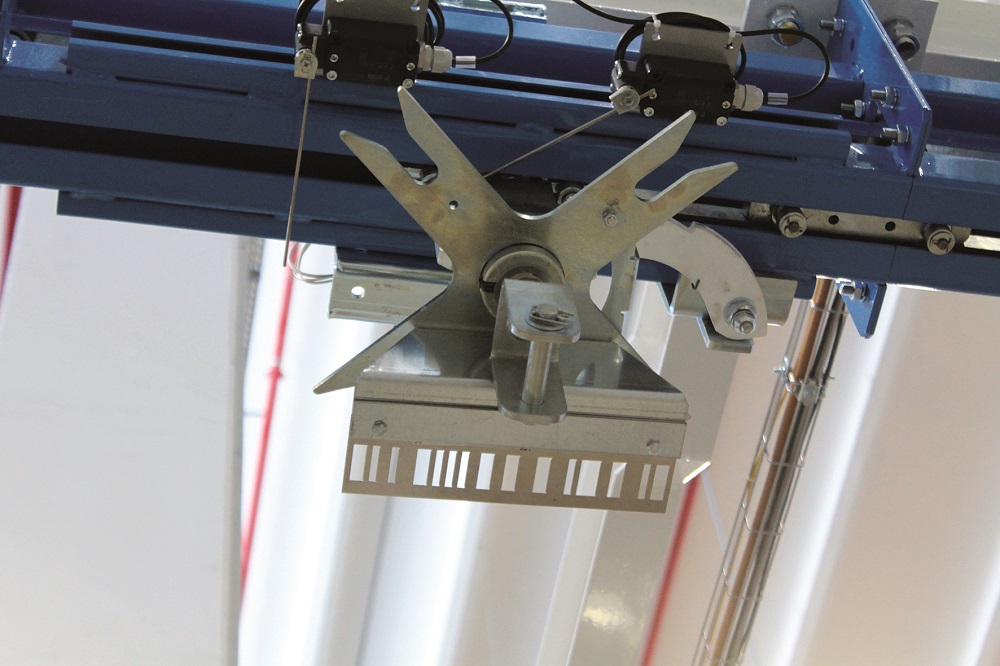 Detail of the unique barcode present on each scale to allow maximum traceability of the process. © ipcm
Detail of the unique barcode present on each scale to allow maximum traceability of the process. © ipcmThe powder coating phase
At BEEP, paint products are applied inside the Super Cube booths supplied by Wagner, which are air-conditioned and located inside a clean room. “We identified the ideal number and type of nozzles through laboratory tests in cooperation with BEEP itself. We also jointly developed a gun positioner that determines the positions from where to dispense the paint,” illustrates Cristian Boem, powder coating area manager at Wagner. The booths are equipped with the Supercenter Evo powder centre, which ensures fast colour change operations and precise parameter management for higher application uniformity and consistency. The application operations are carried out by self-learning robots supplied by CMA Robotics S.p.A. (Pavia di Udine, Udine, Italy) to improve process consistency and repeatability even further.
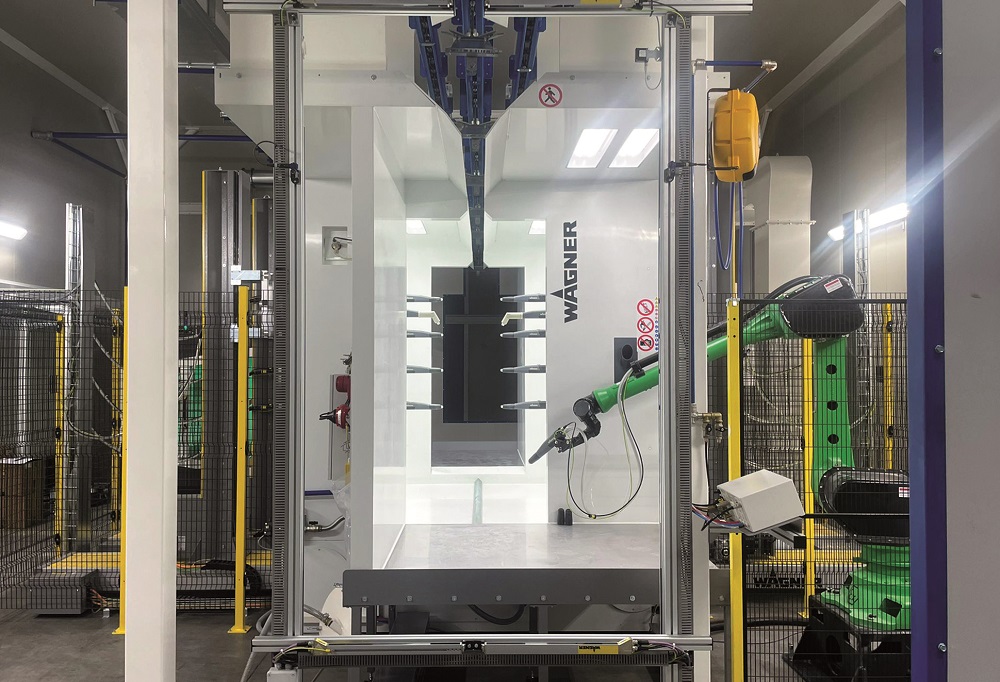 The self-learning robot provided by CMA Robotics. © Visa Impianti
The self-learning robot provided by CMA Robotics. © Visa Impianti“The system is prearranged for installing a second booth for coloured base coat application. Currently, we perform about 2 or 3 colour changes per day, but in future we plan to reach 7 per day. The colours needed to cover the whole Decathlon portfolio are over 50. At BEEP, we are currently applying 22 different tints, but we will certainly be using more and more of them in the coming months. Therefore, we are going to install another Wagner booth to further speed up and optimise our coating cycle and better manage the necessary colour change phases.”
“As far as paint products are concerned, we decided to continue working with Adapta Color and Tiger Coatings, which were already the suppliers of the SMW factory in Romania, our company’s other subsidiary that coats frames on behalf of Decathlon,” says Giaime. “We decided to continue this partnership based on the high quality of the coatings supplied by these manufacturers. Another key factor in choosing to collaborate with Adapta and Tiger was that both companies only have one production site in Europe: we consider this a significant advantage because it guarantees greater reliability and quality consistency of the supplied paint products. Past experiences with other manufacturers have taught us that mixing two paint batches from different production sites often leads to slight colour differences. If not detected by our operators, such inconsistencies risked adversely affecting the quality of our finishes. However, by using Adapta and Tiger powders, we can be certain that even if we mix two different batches, the finish will be uniform and the quality will be consistently high, helping us avoid issues such as lengthened processing times and increased costs for part paint stripping and re-coating,” states Giaime.
A successful partnership
“When deciding on the coating system to be installed, we did not do any market research but turned immediately to suppliers we had already worked with. The decision to rely on manufacturers with whom we already had positive experiences was a crucial element in the success of this partnership during the installation of our new plant. Relying on the same team, whose skills and dependability had already been proven in previous collaborations, guaranteed optimal operational efficiency right from the start of the project. Although the plant is not yet at full capacity – it will be at the end of March 2024 – having already worked with the same partners on two other plants and, of course, with the same customer, namely Decathlon, we can accurately predict our short and long-term results. Our goal is to coat 150,000 bicycles in the first year, 250,000 in the second year, and over half a million by the fifth year, working in two shifts,” indicates Giaime.
“We are confident that, by continuing to collaborate with this expert and reliable pool of companies and using the cutting-edge technology they provide, we are going to fully meet Decathlon’s needs and achieve excellent results in terms of both production capacity and coating quality,” he concludes.